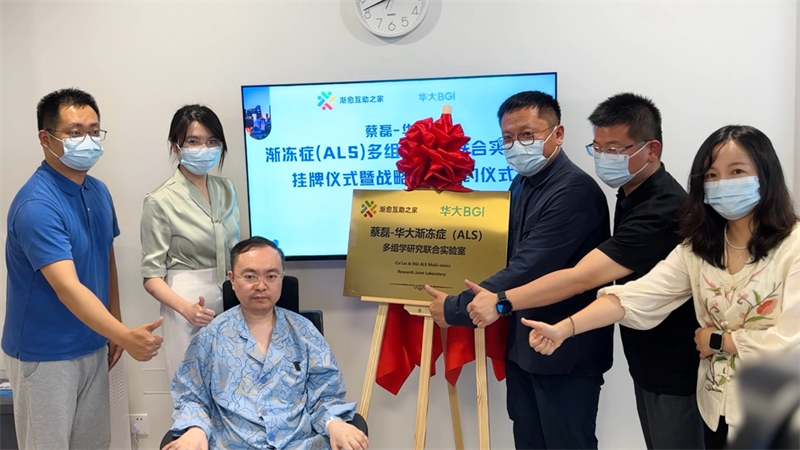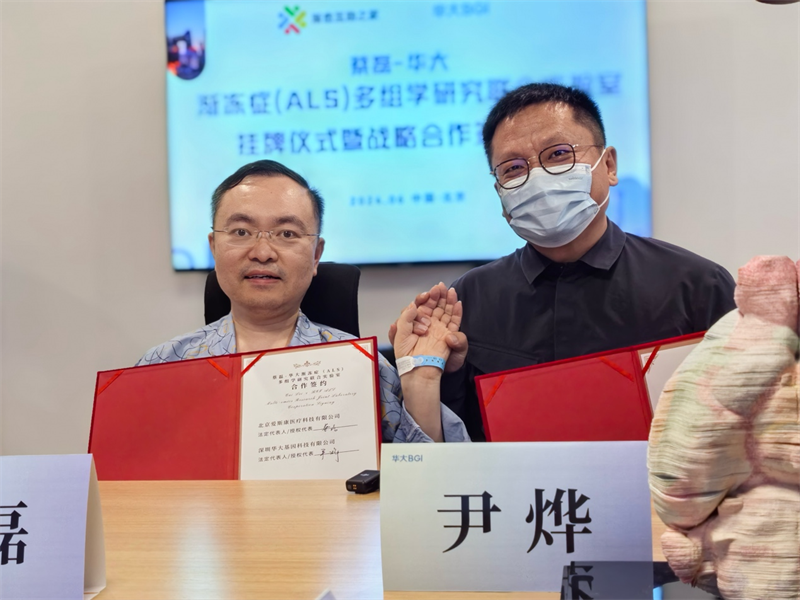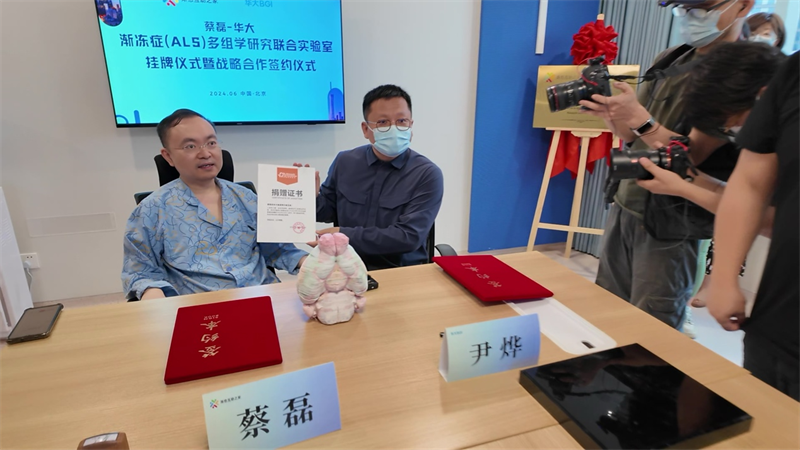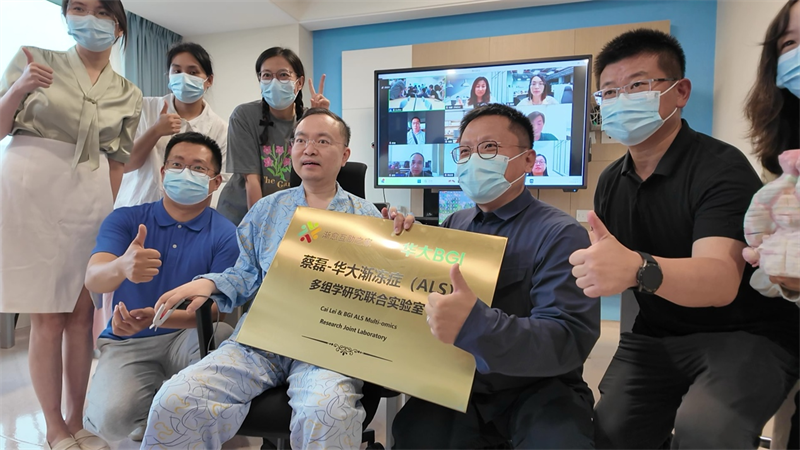Beijing, June 7 – Mr. Cai Lei, Founder and CEO of the "Gradually Healing Mutual Aid Home" platform, and Dr. Yin Ye, CEO and Executive Director of BGI Group, announced their collaboration to create a multi-omics research joint laboratory to accelerate the research of ALS.
Amyotrophic lateral sclerosis (ALS) is a fatal motor neuron disease that causes the progressive degeneration of nerve cells in the spinal cord and brain. The establishment of the joint laboratory is expected to deepen the cooperation between the two parties, accelerate progress in the current multi-omics research field of ALS, and provide new insights into the diagnosis of ALS, quantitative assessment of disease progression, and the discovery of intervention targets.
 Mr. Cai Lei, Founder and CEO of the Gradually Healing Mutual Aid Home Platform (third from the left), and Dr. Yin Ye, CEO and Executive Director of BGI Group (third from the right), unveiled the joint laboratory.
Mr. Cai Lei, Founder and CEO of the Gradually Healing Mutual Aid Home Platform (third from the left), and Dr. Yin Ye, CEO and Executive Director of BGI Group (third from the right), unveiled the joint laboratory.
In his opening speech at the signing ceremony, Mr. Cai, who has ALS, expressed his deep hopes for this cooperation. He praised Dr. Yin and the BGI team for their substantial scientific research assistance.
Over the past 18 months, both parties have made remarkable achievements in large-scale whole-genome testing of ALS. With the help of BGI's spatiotemporal omics technology, the latest discovery of muscle inflammatory factors has opened new avenues for interpreting the cause of ALS.
The establishment of the joint laboratory will enable both parties to further integrate genomics, spatiotemporal omics, and other multi-omics data, including proteomics, metabolomics, and immunomics, with the aim of achieving breakthroughs in the treatment of rare and difficult diseases.
Mr. Cai emphasized that the vision of this cooperation goes beyond academic achievements and commercial interests. Both parties are committed to building a more open data-sharing platform, attracting more partners, jointly improving the scientific research landscape, and pursuing long-term social value. He noted that this cooperation model will benefit both ALS patients and other rare disease groups.
Dr. Yin emphasized in his speech that despite Mr. Cai’s physical limitations, he is determined and has clear goals, which has brought unprecedented hope to the field of rare disease research.
The cooperation between BGI and Mr. Cai began with the large-scale sequencing of his entire genome. This process not only deepened the understanding of the genetic factors of ALS but also attracted society’s attention to rare diseases.
At the signing ceremony, Mr. Cai Lei and Dr. Yin Ye jointly signed a strategic cooperation agreement, marking the official establishment of the "Cai Lei & BGI ALS Multi-omics Research Joint Laboratory." Mr. Cai Lei and Dr. Yin Ye jointly unveiled the joint laboratory.
 Mr. Cai Lei (left) and Dr. Yin Ye signed a strategic cooperation agreement to officially establish the "Cai Lei & BGI ALS Multi-omics Research Joint Laboratory."
Mr. Cai Lei (left) and Dr. Yin Ye signed a strategic cooperation agreement to officially establish the "Cai Lei & BGI ALS Multi-omics Research Joint Laboratory."
Dr. Jin Xin, Chief Scientist and Director of the Institute of Precision Health Research at BGI-Research, discussed the research progress, basic information, analysis process, sequencing results, and the technology outlook on the genetic pathogenesis of ALS based on whole-genome sequencing. A summary of rare harmful mutations found 231 genes that have not been previously reported to be related to ALS, and that are enriched in the cellular components of muscle cells. The use of advanced artificial intelligence technology is also accelerating the research on causative mutations in ALS.
The second phase of free whole-genome sequencing tests for familial ALS patients officially commenced at the end of 2023. The program plans to offer high-depth whole-genome sequencing tests for 200 family lineages, with the testing costs jointly covered by Dr. Yin and Mr. Cai.
So far, the BGI team has completed high-depth whole-genome testing, data analysis, and clinical interpretation of the first batch of 72 complete family lineages enrolled in the second phase of the program. A total of seven positive cases were detected, with an overall positive rate of 9.72%. A total of 198 mutations were detected in this batch. The positive detection rate of whole-genome family lineages was significantly higher than that of a single person. For patients whose causes have not been determined, further data mining and genetic analysis will be used to discover new potential disease-causative genes and mutation markers.
Dr. Liu Longqi, Chief Scientist and Director of the Institute of Cell Omics at BGI-Research, presented a detailed introduction to spatiotemporal omics analysis for the mechanism of muscle microenvironment degeneration in ALS, including the definition of spatiotemporal omics, the application of spatiotemporal omics technology, and the search for possible common mechanisms underlying the onset of ALS.
The cause of ALS is currently unknown, and there are significant differences among patients. More advanced means should be used to further explore targetable downstream common mechanisms. By using Stereo-seq, a high-resolution spatiotemporal omics technology developed by BGI, researchers analyzed the microenvironment of muscles in ALS patients and, for the first time discovered unique muscle fibers and a new inflammatory factor in the muscle fibers of early-stage ALS patients. This discovery will provide new insights for the diagnosis of ALS, quantitative assessment of disease progression, and the identification of intervention targets.
Dr. Yang Shuang, Executive Vice President of BGI Group, spoke at the ceremony and expressed his admiration for Mr. Cai Lei's courage in fighting the disease. He noted that BGI is committed to accompanying partners in disease exploration and is willing to donate funds for relevant scientific research.
 Mr. Cai Lei (left) and Dr. Yin Ye display the donation certificate.
Mr. Cai Lei (left) and Dr. Yin Ye display the donation certificate.
In the future, through the combination of BGI's world-leading whole-genome sequencing and spatiotemporal omics technologies, real samples will be directly linked to clinical pathology, and drug targets can be identified more efficiently. This will provide critical insights into genetic risk factors.
 A group photo of the Gradually Healing Mutual Aid Home team and the BGI team.
A group photo of the Gradually Healing Mutual Aid Home team and the BGI team.
Dr. Yin stated, "I believe that Mr. Cai Lei's current team and the surrounding teams are the highest level and largest ALS research team in the world. With the support and dedication of numerous ALS patients, along with the joint efforts of the BGI team and the Gradually Healing Mutual Aid Home team, the mission to overcome ALS will be very successful.”



